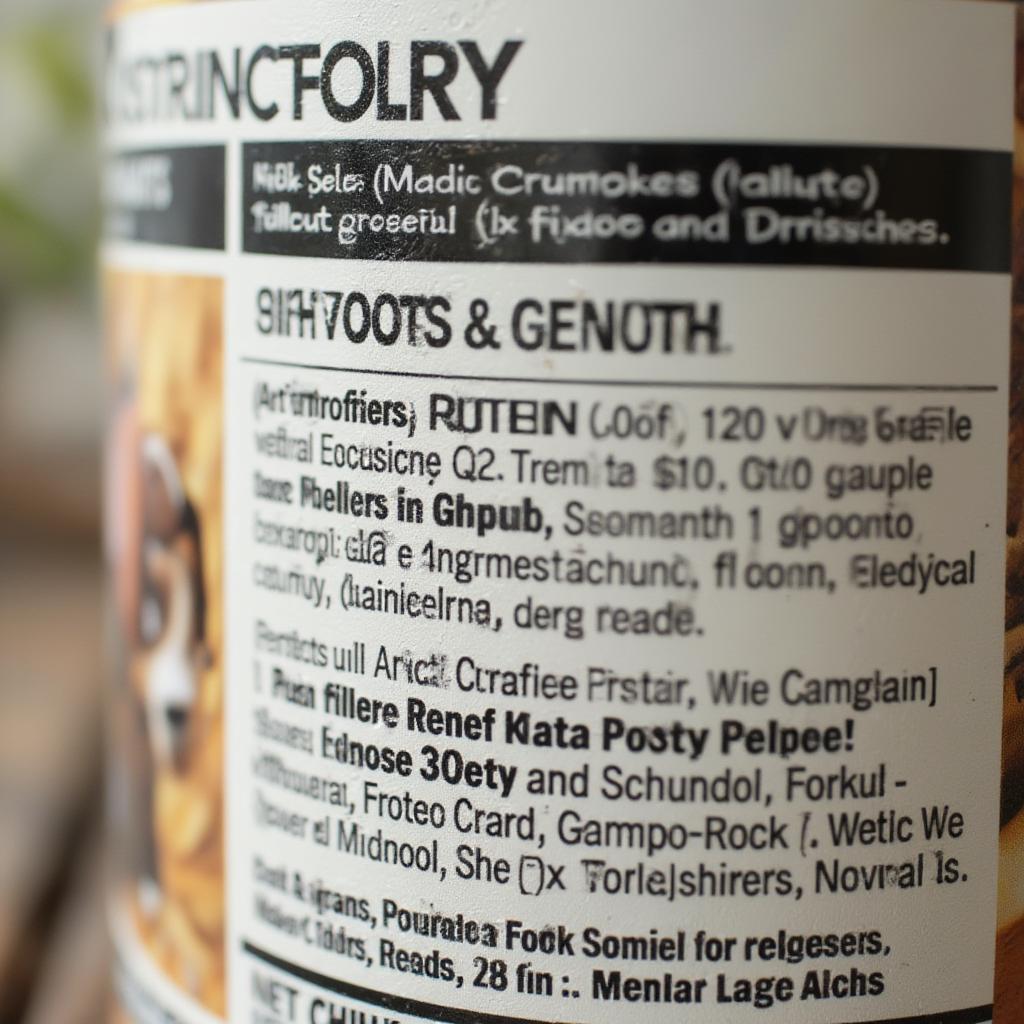Choosing the most nutritious dog food for your small breed companion can feel overwhelming. With countless options lining pet store shelves and dominating online marketplaces, how do you determine the best fit for your furry friend? This comprehensive guide will delve into the essential factors to consider when selecting a nutritious diet, ensuring your small dog thrives.
Decoding the Nutritional Needs of Small Dogs
Small dogs, with their higher metabolism and energy levels, require a diet specifically formulated to meet their unique needs. Unlike larger breeds, they burn calories faster and need more energy-dense food. This means their food should be packed with high-quality protein, healthy fats, and essential vitamins and minerals in a smaller, more manageable kibble size.
Why Size Matters: Tailoring Nutrition to Small Breeds
Smaller kibble size is crucial for small dogs due to their smaller mouths and teeth. Larger pieces can be difficult to chew and swallow, leading to potential choking hazards or digestive issues. Furthermore, small breeds are prone to certain health conditions, such as dental problems, hypoglycemia (low blood sugar), and obesity. Choosing a food that addresses these concerns is vital for their long-term well-being. For instance, a food rich in fiber can aid digestion and help maintain a healthy weight. Similarly, incorporating specific nutrients for dental health, like calcium and phosphorus, can help prevent tartar buildup.
Essential Nutrients: Building Blocks for a Healthy Small Dog
Just like humans, dogs require a balanced diet consisting of essential nutrients. These include:
- Protein: The cornerstone of a healthy diet, protein provides amino acids necessary for muscle development, tissue repair, and overall growth. Look for dog foods with high-quality animal protein sources, such as chicken, lamb, fish, or beef.
- Fat: Essential for energy production, healthy skin and coat, and proper organ function. Sources like chicken fat, fish oil, and flaxseed oil provide beneficial omega-3 and omega-6 fatty acids.
- Carbohydrates: Provide energy and fiber for digestive health. Opt for complex carbohydrates like brown rice, sweet potatoes, and oats, rather than simple sugars.
- Vitamins & Minerals: Crucial for various bodily functions, supporting immune health, bone strength, and overall well-being. Look for foods fortified with essential vitamins and minerals.
Deciphering Dog Food Labels: A Guide for Informed Choices
Understanding dog food labels is crucial for making informed decisions. Pay close attention to:
- Guaranteed Analysis: This section lists the minimum percentages of crude protein, fat, fiber, and moisture.
- Ingredient List: Ingredients are listed in descending order by weight. Look for whole food sources and avoid artificial colors, flavors, and preservatives. You may also want to consider the best dog food for sensitive stomach and skin.
- AAFCO Statement: The Association of American Feed Control Officials (AAFCO) statement verifies that the food meets minimum nutritional requirements for a specific life stage (puppy, adult, senior).
 Analyzing Dog Food Label Ingredients
Analyzing Dog Food Label Ingredients
Life Stage Nutrition: From Puppyhood to Senior Years
Nutritional needs change throughout a dog’s life. Puppies require more calories and specific nutrients for growth, while senior dogs need fewer calories and support for joint health and cognitive function. For growing puppies, consider exploring the best puppy food for sensitive stomach and diarrhea. Likewise, for dogs struggling with weight, information on the best food to help dog gain weight can be beneficial.
Addressing Specific Dietary Needs: Allergies, Sensitivities, and More
Many small dogs suffer from food allergies or sensitivities. Common culprits include beef, chicken, wheat, and corn. If your dog experiences digestive upset, skin irritations, or other allergy symptoms, consider a hypoallergenic or limited ingredient diet. In such cases, looking into the best dog food for gi issues can provide valuable insights. You might also find helpful recipes in our guide on best dog food recipes for small dogs.
Conclusion: Nourishing Your Small Dog for a Long and Happy Life
Choosing the most nutritious dog food for your small dog is a significant decision. By understanding their unique needs and carefully considering the factors discussed in this guide, you can provide your furry friend with the foundation for a healthy and vibrant life. Always consult with your veterinarian to discuss the best dietary options for your individual dog’s needs.
FAQ: Frequently Asked Questions About Small Dog Nutrition
-
What is the best type of protein for small dogs? High-quality animal proteins like chicken, fish, lamb, and turkey are excellent choices.
-
How much should I feed my small dog? Follow the feeding guidelines on the dog food label and adjust based on your dog’s age, activity level, and weight.
-
Are grain-free diets good for small dogs? While some dogs thrive on grain-free diets, they are not necessary for all. Consult your veterinarian to determine if a grain-free diet is appropriate for your dog.
-
How can I tell if my small dog has a food allergy? Symptoms of food allergies include itching, skin rashes, vomiting, and diarrhea. Consult your veterinarian for diagnosis and treatment.
-
What are some common signs of poor nutrition in small dogs? Signs include dull coat, low energy levels, weight loss or gain, and digestive issues.
-
Should I supplement my small dog’s diet with vitamins? Only if recommended by your veterinarian. A balanced diet should provide all the necessary nutrients.
-
How often should I change my small dog’s food? Avoid frequent changes unless necessary due to allergies or other health concerns. Gradual transitions are essential to prevent digestive upset.
